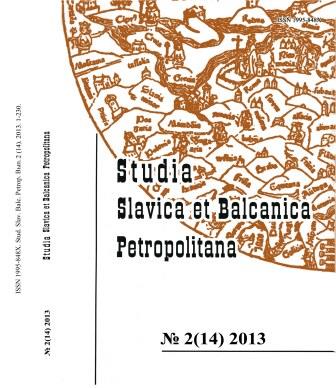Об обремененности историографии современными социальными контекстами: Примеры из «влаховедения»
On the fixation of historiography on contemporary social contexts: Examples from «Vlachology»
Author(s): Marko PijovicSubject(s): History
Published by: Издательство Исторического факультета СПбГУ
Keywords: Vlachs; identity; nationalism; Middle Ages; bilingualism
Summary/Abstract: This article discusses several issues related to the vlachology studies. By «vlachology» the author refers to the general study of Vlachs, the history of the term Vlach, the people or peoples named by that term, and basically all themes related to the Vlach phenomenon. The article is divided into three chapters, each of which dealing with somewhat different issues, but all of them being a part of a broader research problem. The first part of the article deals with the problem of using small and capital letters in writing the names of historical identity groups, or presumed identity groups, like for example the medieval Vlachs. The author argues that the issue of writing a group/collective name with or without the capital letter is essentially not a linguistic one, as it may seem on the surface, but rather an ideological one, and is based on our contemporary values and traditions, which distort our perception of the past. In the second chapter the author addresses the issue of bilingualism/multilingualism in the medieval Balkans and on the east Adriatic coast. The main focus is on the question whether the concept of bilingualsm can be defined at all and then applied to a certain historical phenomenon. The author argues that the concept of bilingualism is more of a modern construct then a historical category. Another aspect of the bilingualism narrative is the tendency to often link bilingualisms to certain linguistic or ethnic groups, as if being bilingual or multilingual in history was somehow connected to being a member of a certain (for instance «opressed») ethnic group. In questionning this thesis the author provides historical examples of bilingualism being in no way connected to the (ethnic) «origins» of the bilingual individual or the bilingual group. The final chapter discusses some issues of the general terminolgy, and its use in the Vlach studies, and also onomastic issues, that is, the Romanic suffixes in Slavic personal names, and — connected to it — the «Romanianizing» tendency which can be noticed in some works dealing with Vlachs and Balkan history. The author concludes that not only is there an erroneous tendency to identify all Vlachs with Romans, or people speaking romance languages, but also to identify them with a specific group of romanophones: the Romanians.
Journal: Петербургские славянские и балканские исследования
- Issue Year: 2013
- Issue No: 2
- Page Range: 92-119
- Page Count: 28
- Language: Russian

